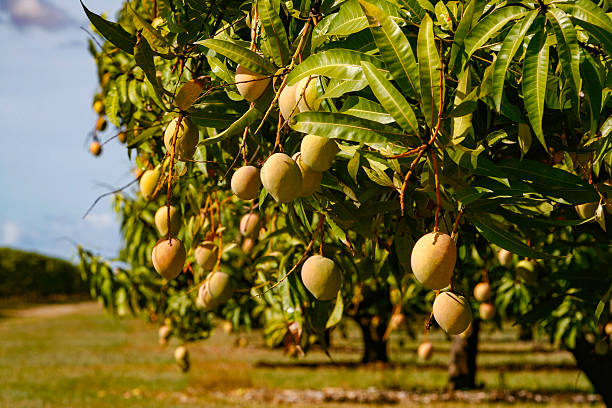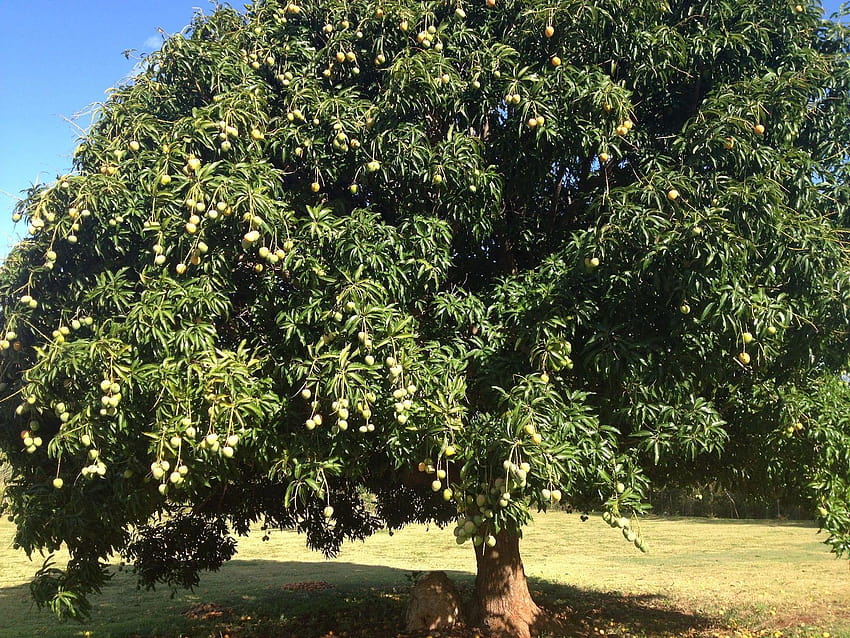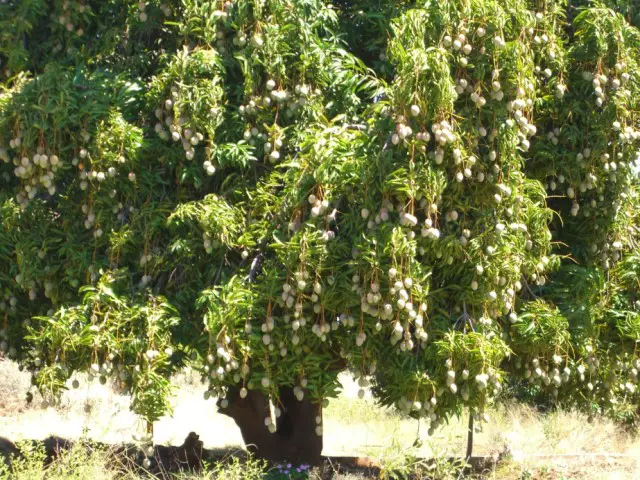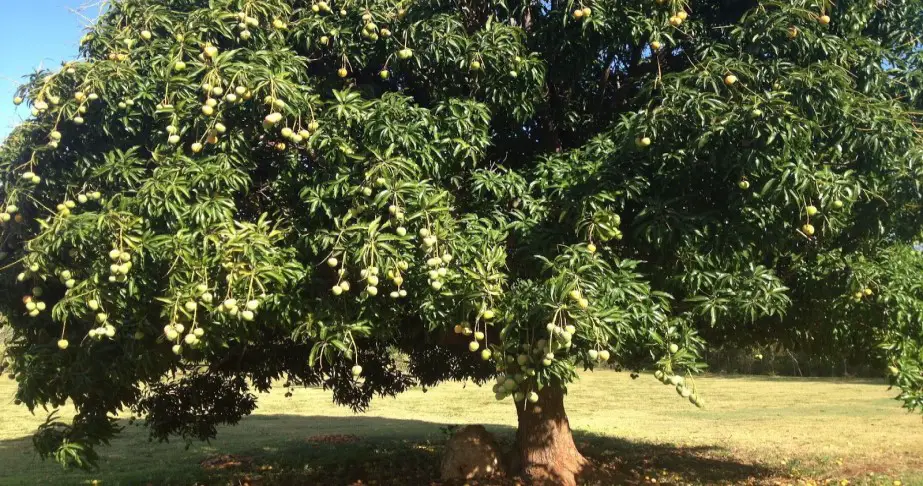As an avid gardener or mango tree enthusiast, you understand the importance of creating an optimal environment for your trees to thrive.
From providing ample sunlight to implementing proper irrigation techniques, every aspect plays a crucial role in the success of your mango trees.
One often overlooked yet vital factor in maintaining healthy and productive mango trees is choosing the right mulch.
And that’s a good reason why you must read this blog post to the end.
Best Types of Mulch for Mango Trees
When it comes to choosing the right mulch for mango trees, here are the most recommended options.
1. Straw or Hay
This is a beloved choice for mango trees due to its excellent moisture retention capabilities.
It forms a protective layer on the soil, which reduces evaporation and conserves water for the tree’s roots.
It helps suppress weed growth by blocking sunlight and preventing weed seeds from germinating.
As the mulch breaks down, it adds organic matter to the soil, enriches it with nutrients, and improves overall soil structure.
Pros
- It reduces the need for frequent watering
- Suppresses the growth of weed
- Enhances soil fertility
Cons
- Can attract pests, such as rodents or insects
- Needs to be replenished regularly as it decomposes relatively quickly
- May contain weed seeds if not properly sourced
Related: Best Gravels to Walk on Bare Feet
2. Wood Chips or Shredded Bark
Wood-based mulches, such as wood chips or shredded bark, offer several benefits for mango trees.
They provide effective weed control by creating a barrier that inhibits weed growth and competition for nutrients.

These mulches also help retain moisture by reducing evaporation from the soil surface.
As they break down over time, wood-based mulches improve soil structure and promote beneficial microbial activity.
The microbial activity aids in nutrient cycling and enhances the overall health of the soil, which in turn benefits the mango tree’s growth and productivity.
Pros
- Effective weed control by forming a barrier that blocks weed growth
- Helps retain moisture in the soil
- Improves soil structure and promotes beneficial microbial activity
Cons
- Decomposition can deplete nitrogen in the soil temporarily
- Some types of wood chips or bark may take longer to decompose
- Large wood chips can be prone to mold or fungus growth
3. Compost
It serves a dual purpose as both a mulch and a soil amendment.
When used as mulch around mango trees, compost retains moisture by preventing water loss through evaporation.
It also suppresses weed growth by smothering weed seeds and preventing them from germinating.
As the compost breaks down, it releases nutrients into the soil, enriching it and providing essential elements for the mango tree’s growth.
It also improves the soil’s ability to retain moisture over time, reducing the frequency of irrigation needed.
Pros
- Retains moisture in the soil, reducing water requirements
- Suppresses weed growth by smothering weed seeds
- Enriches the soil with nutrients and beneficial microorganisms
Cons
- Requires a continuous supply of compost material
- May attract pests if not properly managed or balanced
- Can be expensive or time-consuming to produce in large quantities
Related: Best Mulch Options for Pear Trees
4. Leaves or Grass Clippings
They’re readily available mulch materials that offer several benefits for mango trees.

When used as mulch, they add organic matter to the soil, which improves soil structure and fertility.
This organic matter enhances moisture retention by increasing the soil’s ability to hold water, ensuring the mango tree’s roots receive adequate hydration.
Furthermore, leaves and grass clippings act as a natural weed deterrent by forming a barrier that prevents weed seeds from germinating and penetrating the soil.
Pros
- Readily available and cost-effective mulch materials
- Adds organic matter to the soil
- Promotes moisture retention and helps suppress weeds
Cons
- Decomposition can be slow, especially for whole leaves
- Thick layers of leaves or grass clippings can mat together and hinder water penetration
- May require shredding or regular maintenance to avoid matting or clumping
5. Gravel or Rocks
Inorganic mulches like gravel or rocks provide unique advantages for mulching mango trees.
They’re excellent at suppressing weed growth, as they create a physical barrier that prevents weeds from emerging.
Gravel or rocks allow water penetration into the soil, preventing water runoff and ensuring that the mango tree’s roots receive adequate moisture.
These inorganic mulches can add a decorative element to your garden and enhance the visual appeal of your mango tree landscape.
Pros
- Excellent weed suppression by creating a physical barrier
- Allows water penetration into the soil, reducing runoff
- Offers a decorative element to the garden
Cons
- Doesn’t contribute organic matter or nutrients to the soil
- Can absorb and radiate heat, potentially affecting soil temperature
- Not suitable for all landscapes or aesthetic preferences
Related: Best Mulches for Avocado Trees
6. Rubber Mulch
Rubber mulch, made from recycled tires, offers long-lasting weed control and moisture retention.
It forms a dense layer that prevents weed growth by blocking sunlight and inhibiting weed seed germination.
Rubber mulch retains moisture in the soil, reducing the need for frequent watering.
However, it may contain chemicals or toxins that could leach into the soil or affect the health of the mango tree.

Pros
- Provides long-lasting weed control and moisture retention
- Made from recycled materials, which helps to contribute to sustainability
- Durable and requires minimal maintenance
Cons
- May contain chemicals or toxins from the recycled tire material
- Potential environmental concerns regarding leaching or disposal
- Doesn’t add organic matter or nutrients to the soil
7. Landscape Fabric
Landscape fabric is a synthetic material that effectively prevents weed growth while allowing water and air circulation.
It acts as a physical barrier, blocking sunlight and preventing weed seeds from germinating. It also helps retain moisture in the soil by reducing evaporation.
When using landscape fabric, it’s crucial to ensure proper installation, including properly securing the edges and cutting slits or holes for the mango tree’s trunk.
This helps avoid soil compaction and allows the mango tree to access air and water.
Pros
- Highly effective at weed suppression by blocking sunlight
- Allows water and air circulation to maintain soil health
- Long-lasting and low maintenance
Cons
- Requires proper installation and securing to prevent soil compaction
- Can inhibit root growth if not adequately managed
- May become less effective over time as weeds can penetrate through small gaps or tears
Related
- Best Mulch for Perennials
- 10 Best Mulch for Wet Areas
- Top 10 Wholesale Mulch Suppliers
- Top 7 Disadvantages of Decomposed Granite
- Grass Mulching Pros and Cons
- Gorilla Hair Mulch Pros and Cons
- Ultimate Guide: How to Use Lava Rocks for Plants
- 10 Best Gravels to Walk on Bare Feet
- 5 Best Mulch Options for Pear Trees
- 5 Best Mulches for Avocado Trees
- 6 Best Mulches for Cherry Trees (Organic & Inorganic)
- 6 Best Mulches for Peach Trees
- 5 Best Mulches for Apple Trees
- 8 Best Mulches for Citrus Trees in Pots

